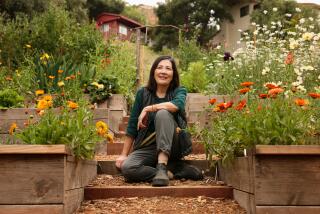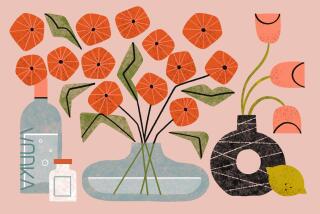Saves effort, and space
- Share via
FOR any gardener whose two-car garage is more like a no-car storage shed, there is this: the Fold-a-Cart, a wheelbarrow that collapses when not in use and can be stowed against a wall, preserving precious floor space.
The powder-coated steel frame supports a flexible tub that’s guaranteed by the manufacturer to be tear- and puncture-resistant for 10 years, though users are discouraged from hauling sharp-edged cargo. The smaller “garden” version of the cart can fit 6 cubic feet of pretty much anything -- dirt, leaves, abandoned dog toys (as long as those toys weigh 200 pounds or less). The larger “professional” model has a maximum payload of 9 cubic feet and 400 pounds.
Fold-a-Cart’s space-saving potential is its most obvious feature. The folded cart is small enough to fit in a car trunk, and it comes with a mounting bracket for convenient wall storage. The fact that the contraption actually works nicely as a wheelbarrow almost seems like a bonus.
In a test run hauling 100 pounds of rounded-edge rock up a slanted driveway and over a curb, the cart performed admirably -- smooth and steady, not a pebble spilled. Our only complaint was the slightly awkward mechanism for folding and unfolding the tub.
The suggested retail is $139.95 for the smaller cart, shown here, and $219.95 for the larger model. Both are available through the website of Canadian manufacturer Fold-a-Tools Management, www.foldatools.com.
Even waste isn’t wasted
POOP in a bottle may not seem like cause for celebration, but organic gardeners just might hail the product line expansion from TerraCycle, the company that makes liquid plant foods and fertilizers from worm castings.
Albe Zakes, a TerraCycle spokesman who gives his title as “Eco-Revolutionary,” says his firm is rolling out several new poop-based products nationally this year. New lawn and garden fertilizers, tomato food and seed starter are joining the existing line of orchid, African violet and general-purpose foods.
All are packaged in recycled plastic soda bottles collected from schools and nonprofit organizations. Spray tops are attached to 20-ounce bottles of ready-to-use plant food. The concentrated lawn fertilizer comes in 34-ounce bottles with hose attachments for easy application. And for the really serious? All-purpose and tomato foods come in two-liter bottles.
The New Jersey company was conceived in 2001 by Tom Szaky and Jon Beyer, two Princeton University students who entered their business plan in a Princeton Entrepreneur Club contest. The duo found investors for their idea, and the rest is poop history.
TerraCycle’s retailers include Target, Home Depot, Wal-Mart and Whole Foods. Suggested retail prices start at $3.97 for the 20-ounce plant foods. For more stores or additional details on the company’s amusing history, go to www.terracycle.net.
Cheat sheet for rose buyers
IT’S not exactly scintillating reading, nor is it the prettiest publication you’ll ever see. But like an old-school phone book, the American Rose Society’s 2007 Handbook for Selecting Roses can come in handy.
The selection guide lists more than 3,000 varieties, as rated on a scale of 1 to 10 by members of hundreds of rose clubs across the country. The deep pink General MacArthur, for example, rates a 6.9 (“average”), while the old garden rose Reve d’Or rates a 9.3 (“one of the best ever”). With each listing are notes about color, petal count and the year the rose was introduced.
The 96-page booklet is small enough to slip into a pocket, so you can take it to the nursery and look up any varieties before buying. Perfectionists also can find the top-ranked roses indexed in the front of the booklet by category: climbers, floribundas, hybrid teas, miniatures and shrubs. Winners of various rose contests are listed too.
The handbook sells for $3.50. To order call (800) 637-6534 or go to www.ars.org.
-- Craig Nakano







